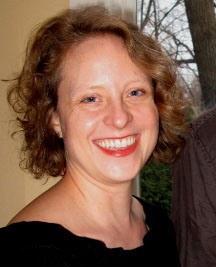The Ellison Medical Foundation has selected Amy Ralston, an assistant professor of Molecular, Cell, and Developmental Biology at UC Santa Cruz, as a New Scholar in Aging, providing $400,000 over four years to support her research on the biology of stem cells.
The unique ability of stem cells to produce large numbers of many different cell types in the body makes them an extremely valuable tool in regenerative medicine. But cells accumulate genetic defects with age, so stem cells derived from older patients may have limitations. Ralston will use the funding from the Ellison Medical Foundation to investigate the effects of aging on the quality of stem cells.
A major breakthrough in stem cell research was made by Japanese researchers who developed a technique to convert mature cell types into cells with the properties of embryonic stem cells. Like embryonic stem cells, these reprogrammed cells are "pluripotent," capable of producing many different cell types. As a result, stem cells for therapeutic uses could be derived from a patient's own cells, providing a perfect genetic match and eliminating the need for immunosuppressant drugs that patients must take to prevent rejection of foreign cells by the body.
According to Ralston, however, researchers still need to determine whether the reprogrammed cells differ from true embryonic stem cells in important ways.
"If we want to use them for clinical therapies, we have to understand how aging affects the quality of the stem cell you can make," she said. "They may have properties in common with embryonic stem cells, but they might also have properties in common with an 80-year-old patient, like an increased susceptibility to cancer."
Ralston's research will uncover new information about the aging process and could lead to new techniques for erasing the signs of aging from stem cells. She will also investigate other potential sources of pluripotent stem cells for therapeutic uses. One idea has been to derive stem cells from placental tissue, which could be obtained at birth and stored in a tissue bank as a source of eternally youthful stem cells for therapies later in life. But again, research is needed to assess the quality of stem cells provided by this approach.
"It's just an idea, and we don't really know how it would work," Ralston said. "We need to do comparisons of the quality of stem cells from different sources."
Amy Ralston Selected New Scholar in Aging by Ellison Medical Foundation
August 10, 2010
By Tim Stephens (831) 459-2495

Professor Amy Ralston of MCD Biology selected as New Scholar in Aging by Ellison Medical Foundation
|
